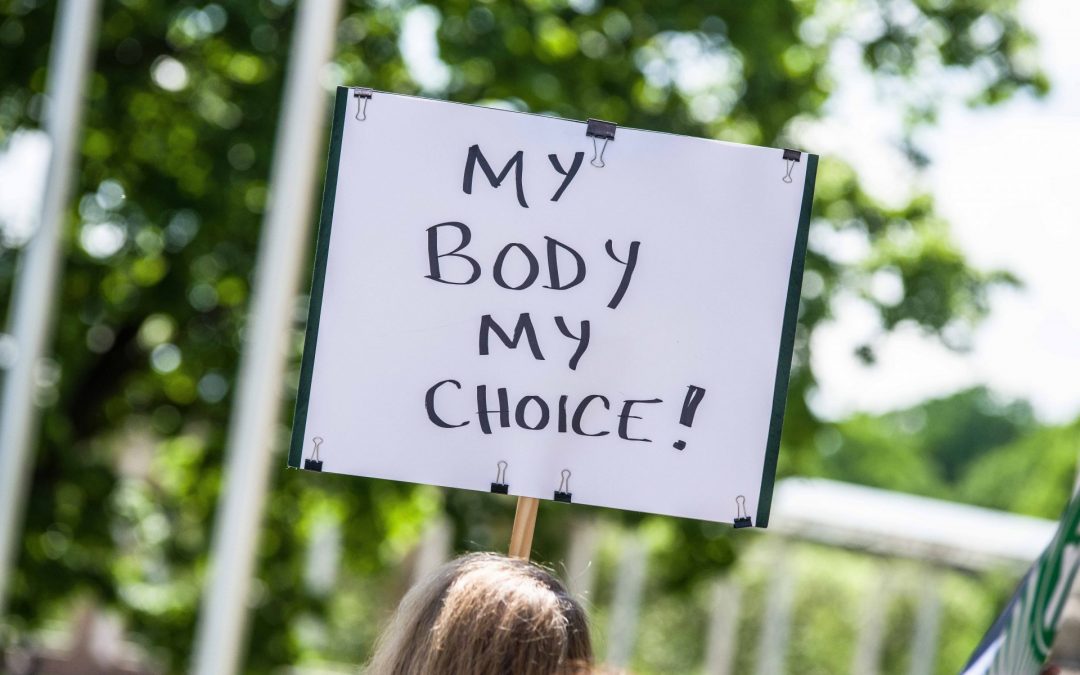 Have the article read by OpenAI (Beta). Please note that AI translations may take some time to process.
Have the article read by OpenAI (Beta). Please note that AI translations may take some time to process.Abortion legislation across the European Union is highly diverse, ranging from some of the world’s most liberal frameworks to some of the most strict.
According to the Center for Reproductive Rights (CRR) advocacy group, only 34 percent of women of reproductive age live in countries (77) where abortion is available to them. It says backstreet abortions lead to 39,000 deaths per year.
The European Parliament has called for abortion rights to be included in the EU Charter of Fundamental Rights, but this remains under debate and would require unanimous agreement.
Spain proposed enshrining a woman’s right to terminate a pregnancy in the constitution in early October, making it the second EU country after France to take this step. On the other side of the spectrum, EU members Malta and Poland have near total bans on abortions.
Many countries range somewhere in-between, but often women can’t access rights that exist on paper: The issue of abortion rights is not only related to legislation and policy, but also to practical aspects of access to and availability of health care.
The case for constitutionals rights: France and Spain
In March 2024, the French parliament voted to anchor the right to abortion in the constitution, making it the first country in the world to offer that explicit protection. According to various surveys, some 80 percent of the population support that step. President Emmanuel Macron also pushed enshrining the right to terminate a pregnancy in in the European Union’s basic law.
In Europe, “nothing is set in stone any longer and everything has to be defended”, he said at a ceremony for the constitutional protection. “This is why I wish for this guaranteed freedom to resort to an abortion to be inscribed in the European Union’s Charter of Fundamental Rights.”
Abortion in France is legal on request up to 14 weeks and can be provided by general practitioners and midwives.

Spain’s left-wing government wants to enshrine the right to abortion in the constitution to protect women from the “reactionary wave” it believes the far-right and the conservative opposition have initiated.
The initiative comes after some regional governments led by the conservative opposition Partido Popular (PP) have refused to fully implement the current abortion law. Specifically, they have refused to create a registry of conscientious objectors that allows medical centers to know which staff they have available to perform abortions.
The government, however, has acknowledged that it will not be easy to reform the constitution, because it needs the support of three-fifths of both houses of parliament, which is impossible to achieve without the PP. The government asked the PP, whose leaders have so far not taken a firm stance on the issue for help, and has defended its decision to try to enshrine abortion in the constitution.
Spain allows abortion up to 14 weeks on request and 22 in case of dangers to the health of the mother or fetal anomalies. Abortion services are available in clinics.
Liberal access: Netherlands, Sweden, Portugal, Denmark, Finland and Belgium
A group of mostly northern European countries provide liberal access with differences mostly in the length of the gestation period in which an abortion is legal on request.
The Netherlands has among the most liberal rules in the EU, with abortion being legal on request up to 22–24 weeks. Procedural barriers are low; there is a five-day waiting period and abortion is widely accessible. This also makes the Netherlands a destination for cross-border abortion care.
In Sweden, abortion is legal on request up to 18 weeks of gestation, after that with a special permission. There is no mandatory waiting period or counsel and services are widely available.
Terminating a pregnancy is legal on request up to ten weeks (Portugal), 12 weeks (Finland) or 18 weeks (Denmark). After the initial period, abortion is allowed for medical or legal reasons.
Liberal, but with hurdles
In Austria, Germany, the Czech Republic, Luxembourg, Ireland, Greece, Estonia, Latvia, Lithuania, Bulgaria, Romania, Slovenia, Slovakia and Cyprus abortion is generally possible up to 10-14 weeks depending on the country, but there are varying degrees of procedural requirements and it is not equally accepted. Due to health reasons or cases of rape or incest later-term abortions are usually also possible.
In Germany abortion is technically a criminal offense but not punishable if performed within the first 12 weeks after mandatory counseling and a three-day waiting period. Later-term abortions are also decriminalised if there are medical indications or after rape.
Access is regionally uneven. Getting an abortion is most difficult in the southern and traditionally catholic states and easiest in the north and the former East Germany.
A push by the previous centre left government for legalisation has been shelved for now.
Ireland, a longtime bastion of Catholicism, legalised abortion in 2018 following a resounding yes vote in a referendum that overturned a constitutional ban.
In Romania, abortion is legal on demand up to 14 weeks of pregnancy and afterwards in exceptional life-threatening cases to the mother or child, but it requires strict and documented medical procedures. Even though abortion is legal, it is not always available in public hospitals, where it is not fully subsidised, and costs can be an obstacle.
According to Bulgarian legislation, elective abortion – the termination of a pregnancy for reasons not considered medically necessary to save the pregnant person’s life – can be performed up to 12 weeks gestation. Later-term abortions are possible where a continuation would endanger the life or health of the mother or viability of the offspring. After 20 weeks only to save the woman’s life or in the presence of proven gross morphological changes or severe genetic damage to the fetus.
There is a nearly unanimous approval of abortions in Bulgaria, conservative political analyst Krystian Szkwarek said in 2023. One reason he gave was that Bulgarians are not deeply religious, which is why they tend to deviate from views held on abortion in other conservative societies such as Poland.
Article 55 of the Slovenian Constitution states that everyone shall be free to decide whether to bear children. However, this topic has recently been the subject of increasingly heated debates.
Opponents of abortion believe that this article of the constitution should be abolished, as denying the right to life to unborn children also contributes to the declining birth rate. The abortion opponents advocate for constitutional amendment and argue that only “life from conception to natural death” is valid, while the pro-choice side defend a society where “reproductive rights, social infrastructure, and healthcare are not privileges, but fundamental public goods”.
The Slovenian Institute 8 March was one of the key organisers of the “My Voice, My Choice” campaign, which calls for EU financial support for safe and accessible abortion. When presenting the around 1.1 million signatures collected, the Institute 8 March emphasised how important it is that the campaign is being led from Slovenia, where it has also been supported by the current political leadership.

Difficult access and conscientious objectors
In Croatia, as in many other countries, the issue of this right provokes deep debate and division in the public. Abortion in Croatia is legal and can be performed on request up to the 12th week from the first day of the last menstruation, or until the end of the tenth week from the conception of the child, and after that only in special, justified circumstances and with the approval of a medical commission.
Access to abortion varies depending on the region and the availability of health services. Cities often have better access to these services than rural areas. In practice access to abortion is difficult because many doctors are conscientious objectors and do not perform abortions. In some public hospitals, all doctors are conscientious objectors.
The situation is similar in the neighbouring candidate country Bosnia and Herzegovina (BiH). There, women are legally allowed to terminate a pregnancy at their own request up to the tenth week of gestation, and afterwards due to health risks or if the pregnancy was the result of a criminal act.
Although this legal framework is relatively liberal compared to the region, reports by the Sarajevo Open Centre (SOC) emphasise that women in BiH often face obstacles when exercising this right, including a lack of medical facilities providing abortion services, varying costs for procedures that are not medically justified, and the possibility for doctors to refuse the procedure on grounds of conscience.
Moreover, the medication used for medical abortion (misoprostol) is not registered for that purpose in BiH, which significantly limits the choice of available methods.
Unlike EU member states that are launching initiatives to constitutionally guarantee the right to abortion, BiH has not yet seen broad social campaigns specifically aimed at embedding this right in the Constitution or elevating it as a national priority. Documentation from analytical organisations highlights that the focus remains on practical accessibility and equality of access rather than on new legislative reforms.
Hungary tightened its abortion law in 2022, obliging women contemplating the procedure to observe the foetus’s “vital functions” such as the heartbeat. The government also promotes pro-natalist policies.
In Italy, abortion is technically legal on request up to 90 days (about 12 weeks) but there are practical barriers to obtaining an abortion as the number of conscientious objectors among medical professionals is high, statistics speak from 63 to up to 80 percent. Defenders of abortion rights demand reforms, among them the elimination of a mandatory seven day waiting period and introduction of abortions for women after 90 days when their health is endangered. There has also been a controversy over moves in some regions to include pro-life movements in public health centres.
The strictest abortion laws
Malta criminalises all abortions, the only exception are cases where the mother’s life is in danger or the foetus has no chance of survival. It tightened its rules in 2023, despite protests.
One country where the societal debate is probably among the loudest, is in staunchly catholic Poland. Abortion rights have been restricted since January 2021, following a ruling by the constitutional court when the possibility of terminating a pregnancy due to severe and irreversible fetal defects was removed. Currently, abortion is legal only when the pregnancy poses a threat to the woman’s life or health, or when it results from a criminal act such as rape or incest.
In terms of social and political initiatives, the issue remains highly divisive: feminist movements such as the All-Poland Women’s Strike advocate for liberalising abortion laws and improving access to reproductive healthcare, while conservative groups continue to push for stricter regulations.
In 2024–25, the government announced certain procedural changes – for example, guidelines ensuring that hospitals do not refuse to perform legal abortions – but the legislation itself remains very restrictive.
Italian bioethicist Chiara Lalli with the Luca Coscioni Association urged that societies must stop treating abortion “only as a moral dilemma”. And: “Clearly, the issue has a moral dimension, but voluntary termination of pregnancy is first and foremost a medical service.”
The debate rages on, with conservative, catholic, and right-wing forces pushing against women’s rights and liberal legislation.
This article is an ENR Key Story. The content is based on information published by ENR participating agencies.
